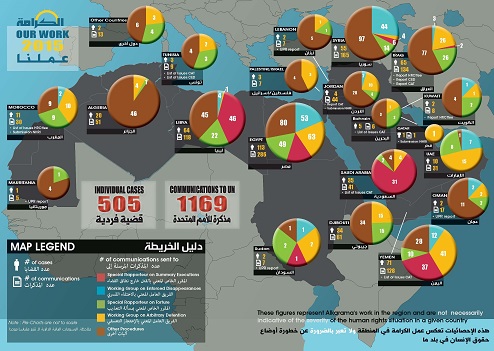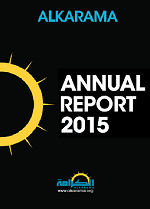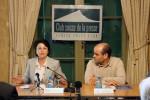Activities
Annual Report 2015 at a glance
|
Human rights in the 20 countries where Alkarama is active
Gulf countries all apply a common political pattern defined by how citizens relate to their rulers. Gulf people are subjects of the King, the Sultan or the Emir, rather than citizens. Anything, including life, is considered a favour and any criticism is seen as an attack against the ruler. Powers are not separated and the judiciary is not independent. In Oman, in Saudi Arabia and recently in Kuwait, Alkarama documented cases of Parliamentarians, lawyers and human rights defenders who were arrested or jailed on the charge of “insult to the Emir” or “breaking allegiance with the King”. Another worrying practice observed in the region is the growing cases of citizens stripped of their nationality as a punitive measure.
In 2015, Iraq witnessed enforced disappearances, torture and other human rights violations under the pretext of the fight against the organisation “Islamic State”; however, the Iraqi authorities deny all violations. In Jordan, freedom of opinion and expression keep moving backwards, and peaceful protestors were arrested in 2015 for “insult to the King”. In Lebanon, the current political stalemate prevents any major improvements of the human rights situation, even though there is a political will. Palestine was the scene of a deterioration of the situation of minors, with an increasing number of Palestinian teenagers and children being arrested, detained and sentenced to heavy penalties by the Israeli occupying forces. As for Syria, the country is experiencing an ever increasing number of human rights violations, resulting in a rising death toll among civilians and a rising number of refugees.
In 2015, Alkarama extended its work on human rights violations in Djibouti. Since the head of State announced that he will run again for president, a violent crackdown against political opponents took place with a peak in December 2015 with the killing of Afar tribe's members. Egypt witnessed in 2015 a violent crackdown on political opponents and civil society that took new forms, including systematic enforced disappearances also targeting minors. In this unstable country, the authorities keep benefiting from impunity and Egypt is sinking into dictatorship. In Sudan, despite governmental promises, Alkarama noticed no improvement in the human rights situation. In a country where rebel areas such as the Darfur still face an armed conflict, overall humanitarian conditions remain a concern. Human rights violations are widespread and systematic, as is the censorship of the media. Torture is also widely practiced by security forces.
In 2015, Libya remains the main concern in the region since the lack of a political solution to the conflict is resulting in worsening security conditions. In Tunisia, Alkarama is concerned with the overall deterioration of the human rights situation, officially justified by the counterterrorism policy. Re-emerging violations that were widespread before the Revolution were noticed, including arbitrary detention, torture and restrictions of freedom of association as well as other fundamental rights. In Algeria, families of victims of enforced disappearances are still claiming their right to know the truth about the fate of relatives who were abducted by security forces during the “black decade“. Members of the civil society and human rights defenders are also subjected to punitive measures. In Morocco, hundreds of persons remain arbitrarily detained for over a decade despite the repeated UN calls for their release. In Mauritania, the enforcement of the anti-slavery legislation is still not effective and human rights defenders peacefully protesting continue to be subjected to police intimidation and judicial harassment.
Summary of 2015 Cases Map (click to enlarge)

Read our press release here Download the full Annual Report 2015 here or click to enlarge and read below :

|
|
| “The Arab world is today the scene of some of the most heinous crimes. Therefore, it must be recognised that human rights are the key issue of the region.„ Dr Mourad Dhina, Executive Director of Alkarama Foundation | |
| “In countries at war, such as Iraq, Libya or Syria, the prevailing human rights situation is even more tragic than in other countries, as people also suffer from violations of the international humanitarian law. And the first victims are the civilians.„ Rachid Mesli, Founder and Legal Director, Alkarama Foundation | |
| “Today, we can affirm that there is not a single Arab country that does not commit torture. In some countries, this practice has taken a surrealist dimension since individuals are tortured and brought on TV shows to confess ‘terrorist crimes’.„ Inès Osman, Coordinator of the Legal Department, Alkarama Foundation | |
| “In 2015, freedom of expression, peaceful assembly and association were under harsh attack by Arab Governments. Bloggers, human rights defenders, artists and journalists were prosecuted because they expressed and peacefully defended their ideas.„ Radidja Nemar, Regional Legal Officer, North Africa, Alkarama Foundation | |
| “In the Arab world, counter-terrorism legislation blatantly violates fundamental guarantees and fair trial rights. Gross human rights violations are committed by State agents under the pretext of the fight against terrorism.„ Julia Legner, Regional Legal Officer, Gulf Region, Alkarama Foundation | |
| “In the Arab region, 2015 was marked by a surge of enforced disappearances. Not knowing where is your spouse, your son or your daughter can have irreversible effects on relatives. In fact, it is a form of torture.„ Thomas-John Guinard, Regional Legal Officer, Nile Region, Alkarama Foundation |
We pay our interns: Alkarama part of the campaign along with 26 other Swiss NGOs
![]() Today, 15 March 2016, 27 non-governmental organisations (NGOs) in Geneva, including Alkarama, commit to paying their interns and drawing attention to the subject of the unpaid internships in international governmental and non-governmental organisations. After various campaigns pushing for change like the "Pay your interns" Initiative, or David Hyde, interning at the United Nations and pretending to be homeless, NGOs in Geneva have heard these calls and are now taking action. An international movement is taking place to improve the outdated practice of not paying interns aiming to address indirect discrimination based on socio-economic background.
Today, 15 March 2016, 27 non-governmental organisations (NGOs) in Geneva, including Alkarama, commit to paying their interns and drawing attention to the subject of the unpaid internships in international governmental and non-governmental organisations. After various campaigns pushing for change like the "Pay your interns" Initiative, or David Hyde, interning at the United Nations and pretending to be homeless, NGOs in Geneva have heard these calls and are now taking action. An international movement is taking place to improve the outdated practice of not paying interns aiming to address indirect discrimination based on socio-economic background.
Alkarama Attends Doha Conference on the OHCHR's Role in Promoting Human Rights in the Arab World
On 13 and 14 January 2016, Alkarama attended the Regional Conference on "the Role of the Office of the High Commissioner for Human Rights [OHCHR] in Promoting and Protecting Human Rights in the Arab Region" in Doha, which welcomed 230 participants from governments, regional and civil society organisations and the OHCHR.
Geneva: 2012 Alkarama Award Ceremony Highlights Dire Human Rights Situation in Gulf Region
Then, the Mayor of Meyrin Pierre-Alain Tschudi took the floor to pay a tribute to the laureates and quoted the famous Uruguayan writer Eduardo Galeano to remind us of the dangers of impunity in the light of human history: "For history not to repeat itself, we must constantly remember it; impunity that awards the offense, encourages the offender. And when the offender is the state itself that violates, steals, tortures and kills without any accountability. Hence, it will give permission to the whole society to violate, steal, torture and kill. And democracy will pay the price for it, in short and long terms."
After the screening of two film-portraits about the laureates, the Mayor of Meyrin presented the Alkarama Award 2012 to Khalid Al Roken and Dr Qaseb Al Oteibi, the representatives of the laureates. Both express their deep gratitude towards our foundation on behalf on their relatives.
The ceremony was concluded by a short poetic and musical interlude: two members of Alkarama Foundation recited excerpts of a poem written by the laureate Dr Saud Al Hashimi while in detention.
At the end of the ceremony, independent journalists that said they had been sent by the Emirati Permanent Mission to the UN began verbally provoking and insulting the participants of the ceremony. This is not the first time such an incident happens with these individuals. In fact, a few months ago, they had created a disturbance during a side event at the Human Rights Council. Alkarama is currently investigating the incident during the Alkarama Award.
--
For more information about the laureates of the 2012 Alkarama Award, you may want to view the two short-documentaries prepared about them for the ceremony:
- Film portrait on Dr Mohamed Al Roken (UAE), click here
- Film portrait on Dr Saud Al Hashimi (KSA), click here
 Algeria
Algeria Bahrain
Bahrain Djibouti
Djibouti Egypt
Egypt Iraq
Iraq Palestine/Israel
Palestine/Israel Jordan
Jordan Kuwait
Kuwait Lebanon
Lebanon Libya
Libya Mauritania
Mauritania Morocco
Morocco Oman
Oman Qatar
Qatar Saudi Arabia
Saudi Arabia Sudan
Sudan Syria
Syria Tunisia
Tunisia United Arab Emirates
United Arab Emirates Yemen
Yemen Other Countries
Other Countries


